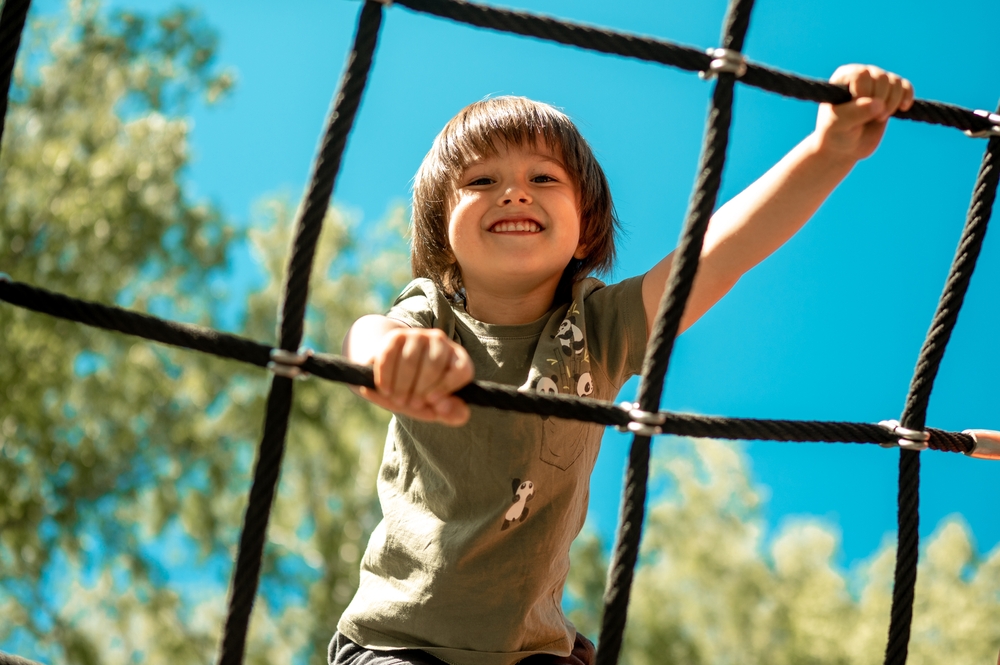If you’re wondering about how playground activities can benefit your child, read this blog from Let’s Grow Pediatrics.
How Can Kids Benefit From Playing At The Playground?
- Kids can improve fine motor skills
- Kids can also improve their gross motor skills as well
- Kids can play with others to build social/emotional skills
- The playground can be full of rich sensory experiences
Playing Can Improve Fine Motor Skills
Fine motor skills are an intricate combination of the brain and muscles working together to perform small movements with the hands and wrists. These skills, which are often overlooked, are essential for completing tasks such as writing, dressing, and brushing teeth. They are a necessary part of everyday life, and are used in school, at work, and in our daily routines.
Playing on the playground gives children the opportunity to practice a variety of grip patterns. The most common grip utilized is the “power grasp”, which involves the thumb encircling an object while the other fingers curl towards the palm. This type of grasp requires strength in the hands and is a common fine motor skill used on the playground. Examples of places where kids can practice the “power grasp” on the playground include climbing a ladder, scaling a rock wall, ziplining, swinging on a swing, traversing monkey bars, holding a seesaw, navigating a jungle gym, and climbing a cargo net.
Playing Can Improve Gross Motor Skills As Well
Gross motor skills involve the use of the large muscles of the body in order to complete everyday tasks, such as standing, walking, running, jumping, and sitting upright at the table. They also involve eye-hand coordination activities, such as throwing, catching, kicking a ball, riding a bike or scooter, and swimming.
There are so many fun ways for kids to practice their gross motor skills at the playground. Examples include walking on uneven surfaces, swinging on the swing, climbing structures, sliding down the slide, climbing up the slide, ladders, rock walls, balance beams, and spring riders. All of these activities help to develop coordination, body awareness, balance skills, and build strength throughout the body.
Playing With Others Can Build Social/Emotional Skills
Playgrounds provide children with an environment to naturally learn and hone important skills for their development. These include turn taking, cooperative play, parallel play, problem solving, decision making, conflict resolution, language development, pretend play, impulse control, risk taking, and following rules/directions.
The Playground Can Be Full Of Rich Sensory Experiences
At the park, a child can explore a variety of sensory experiences that will enrich their playtime. These include vestibular activities such as swinging, seesawing, and sliding; proprioceptive activities like climbing and crawling; tactile experiences like feeling sand, rocks, and tree bark; auditory experiences such as listening to other children and the sounds of nature; and visual experiences such as looking at bright equipment and observing movements in nature.
How Can My Child Benefit From Early Intervention?
At Let’s Grow Pediatrics, we believe in taking proactive steps to prevent delays and learned compensatory patterns in children with developmental diagnosis. As such, we recommend that a physical therapy referral be obtained prior to the first signs of delay. We offer evaluations for developmental disabilities, torticollis, and plagiocephaly from as early as 1 month of age.
Let’s Grow Pediatrics Is The Best Choice For Your Child
If your child is under 18 years old and has some form of injury or delays in development that is affecting their quality of life, he or she may be a good candidate for intensive physical therapy. To find out more about our treatment options and how your child can benefit from Pediatric Intensive Physical Therapy, reach out to Let’s Grow Pediatrics in Edmond, OK. Call 405-562-3485 to schedule your consultation today.

